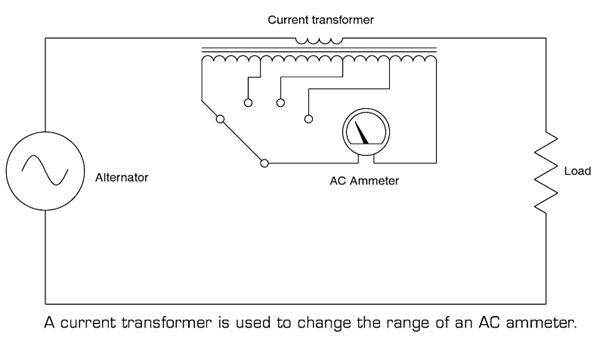The secondary winding of which of the following transformers is always kept closed?
Right Answer is:
Current transformer
SOLUTION
The secondary winding of current transformers is always kept closed. If the current transformer secondary is not shorted when unused and kept open then it can develop a very high voltage across secondary which may damage transformer insulation.
Detail Explanation:-
Instrument transformers are used in conjunction with an ammeter and voltmeter to extend the range of meters. In dc circuit shunt and multipliers are used to extend the range of measuring instruments. The shunt is used to extend the range of the ammeter whereas the multiplier is used to extend the range of voltmeters
This type of ammeter is shown in Figure. The primary of the transformer is connected in series with the load, and the ammeter is connected to the secondary of the transformer. Notice that the range of the meter is changed by selecting different taps on the secondary of the current transformer. The different taps on the transformer provide different turn-ratios between the primary and secondary of the transformer. The working of the current transformer is explained in detail.

- The current transformer is used to step down the current to a lower value so that the current can be measured with a normal range ammeter.
- The current transformer has a primary coil of one or more turns of thick wire having high cross-sectional area and it is connected in series.
- The primary of the current transformer is connected to the load or feeder while the secondary of the current transformer is connected to an ammeter.
- The impedance of the primary is very low, and the currents very high. The primary current is dependent on the load on the line rather than the load on the secondary circuit.
- The current drawn by the secondary has little effect on the line current.
- The secondary of the transformer contains many turns of fine wire having a smaller cross-section area and has much higher impedance. If the secondary is not loaded, this transformer acts to step up the voltage to a dangerous level, due to the high turns ratio. Because of this, a current transformer should always have a short-circuit placed across its secondary winding when connecting or removing any device from its output. By heavily loading the secondary, the high voltage is reduced to the safe level.
- The nominal current rating of the secondary winding of the CT is 5A to 1 A.
- To illustrate the operation of a current transformer, assume that the current ratio of the primary winding is 100 A. The secondary winding has a standard rating of 5A.
- The primary winding consists of three turns of wire, and the secondary winding consists of 60 turns.
- The ratio between the primary and the secondary currents is 100 A/5 A, or 20:1
- In other words, the primary current is 20 times greater than the secondary current.
- Note that the number of turns and the current in the primary and secondary windings are related by an inverse proportion. i.e I1 / I2 = N2 / N1.
- By increasing the number of secondary windings, N2, the secondary current can be made much smaller than the current in the primary circuit being measured. In other words, as N2 increases, I2 goes down by a proportional amount.
